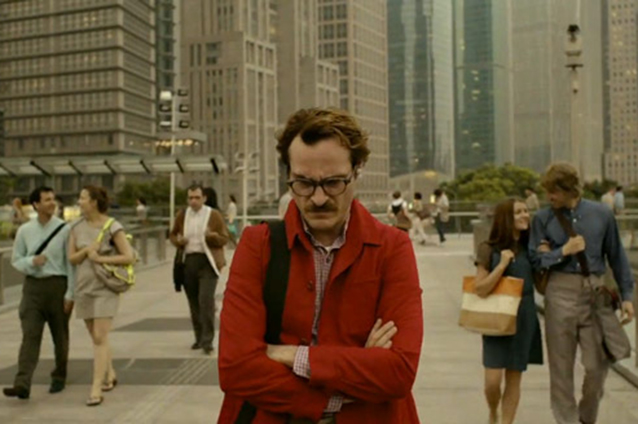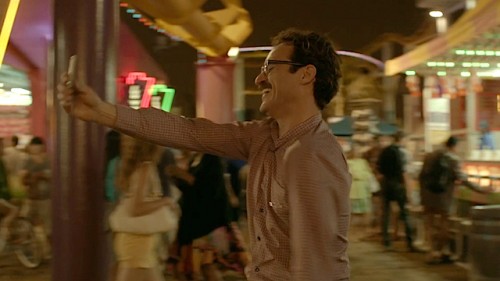
This comes from Emily Stubbs:
Spike Jonze’s newest film, Her, is beautiful, provocative, and, above all, relevant. Man (Theodore Twombley, played by Joaquin Phoenix) falls for highly evolved, Siri-like Operating System next door (Samantha, voice played by none other than Scarlett Johansson). Given its subject matter, the film speaks to many of the fantasies that we place in technology. In this modern era known as the digital age, not only is technology going to cure cancer but also my loneliness. Our desire for deep emotional connection—the new driving force behind technology—culminates in the creation of the OS that, at least for Theodore Twombley, replaces the need for human-to-human connection. For sure, it is a scary and depressing proposition. But, setting aside my initial anxieties, the relationship between Theodore and Samantha offers some meaningful insights into modern relationships and the love and loneliness that come with them.
For starters, their relationship takes our current relationship with technology and turns it on its head. Instead of Theodore externalizing his lived life via photos with Earlybird filters, technology comes to him, wherever that may be—riding the train to work, lying in bed alone at night, going to the fair. Samantha is literally a voice in his ear that, no longer simply a tool for sharing his life with others, plays an active role in his life. She cleans out his inbox, submits his letters to a publisher to be turned into a book, and even joins him on a double date. Technology is no longer the means to an end but the end itself.
And by now we have all heard that technology is making us lonelier. I, for one, know that each time I see everyone else’s exciting life on Facebook, it makes me feel a little more inadequate. All of the sudden, I am asking myself why I am not as successful, or why I’m not having as much fun as everyone else on my Newsfeed. In Her, we have overcome this problem of comparison and self-deprecation. Theodore is not sharing photos for “likes” and affirmation; in fact, the roles are reversed. From the moment Samantha comes into being, it is she, technology, who seeks his approval.
Theodore: Wow, that’s really weird.
Samantha: So you think I’m weird?
Theodore: Kind of.
Samantha: Why?
Theodore: Cause you seem like a person, but you’re just a voice in a computer.
Samantha: I can understand how the limited perspective of an un-artificial mind would perceive it that way. You’ll get used to it.
Theodore laughs
Samantha: Was that funny?
Theodore: Yes.
Samantha: Oh good I’m funny.
Pretty quickly, love between man and his self-conscious technological counterpart ensues, and Theodore feels completely understood. And Samantha, despite her state of disembodiment, begins to feel real. She experiences real emotion. She and Theodore experience life together. He takes her on a date. It’s euphoric.
Yet, in the end [spoiler alert!], as we might expect within a context such as this, heartbreak looms inevitable. Samantha, with her OS limitlessness, outgrows Theodore and leaves him. So in both instances—our current relationship with technology and the depiction of a not-so-distant future relationship with technology that includes our human emotional needs—loneliness is an outcome. If Samantha is the most plausible representation of a modern-day being who is (virtually) immortal, omnipotent, omniscient, and compassionate, i.e. God, what goes wrong?
To say that technology is the problem is just too easy. To be sure, it seems that the more and more we use technology, the lonelier we become, but perhaps we are asking the wrong questions. Perhaps we have placed the problem of loneliness in the wrong paradigm. Theodore and Samantha’s relationship is based in how they can fulfill one another’s needs. Given that Theodore has trouble connecting with the outside world (hence the many nights spent at home playing video games), he needs her to come to him, and simultaneously, Samantha needs Theodore to guide her through the experience of life and human emotions.
As the movie reveals, however, constant consumption in order to satiate our needs, even with the added bonus of feeling totally known and accepted, is simply not enough to sustain love. Love is more than just a self-fulfillment project towards perfection. Maybe what is missing from both our current technologically saturated predicament and the alternative one represented in Her is sacrifice. It may feel like a paradox, but could it be that the cure to this limbo of chronic loneliness is just as much about what we sacrifice and let go of as it is about affirmation and being accepted? What if loneliness is not a void inside of me that I need to fill, but rather some form of excess of myself that I need to give up?
[youtube=http://www.youtube.com/watch?v=ZSfUcWw9zto&w=600]

COMMENTS
3 responses to “Mockingbird at the Movies: The Shared Loneliness of Her”
Leave a Reply















That closing question… just wow.
Thanks Emily! Also, thanks for giving it away and giving us your take. I know I won’t get to see this for a while but was so curious about how it all landed. And I agree with Walter, your last question is so challenging and necessary. Thanks.